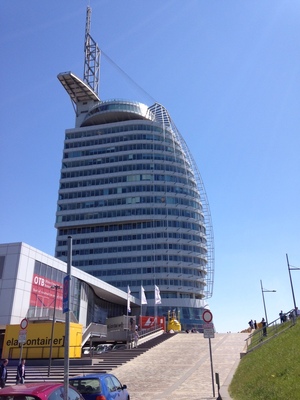News Release from windfair.net
Wind Industry Profile of
Wind Energy and Bird Strikes: A Persevering Myth
It is not to be dismissed and it happens again and again: birds are getting lost in wind power plants and killed. Wind turbines are therefore often called "bird-shredders" by wind energy opponents and, in their view, should be banned. Apart from the obvious polemic, however, the proportionality of the criticism is to be questioned when figures are compared.
Overall, it is very difficult to obtain reliable figures on this issue, since not all dead birds are entering the statistics. The carcasses are often eaten by other animals or decayed somewhere in the high grass in the vicinity of the plants without ever being found, according to the BUND, a German environmental organisation.
It is possible though to reduce the number of bird deaths by different measures as early as the planning stage of the facilities: The measures range from appropriate distances to flight routes and nesting sites to the temporary shutdown of turbines in periods of particularly high bird flight.
Accurate numbers are difficult to collect
In Germany, it is estimated that between 10,000 and 200,000 birds are killed in wind turbines every year, depending which estimation you believe. At first sight, these figures appear to be very high, but the number has to be put in relation to the installed wind turbines: at the end of 2016 there were over 27,000 wind turbines in Germany, according to German wind energy industry association BWE. Thus, on the average, assuming the highest estimate, there were seven dead birds per year and plant.
Habitat in danger
On the list of causes for bird deaths, however, wind power plants are not particularly far ahead. At the very top, the destruction of the birds' habitat is found. Intensive agriculture, clearing of forests and the impregnation of green areas lead to fewer breeding grounds and a dramatic decline, for example, of insects, one of the main foodstuffs of the animals.
In the end, climate change plays an increasingly important role, as a recent study by a team of scientists around James Watson of the School of Earth and Environmental Sciences at the University of Queensland in Australia and Michela Pacifici of Sapienza University in Rome has shown in the magazine Nature Climate Change. According to an analysis of 130 studies, almost 700 species of birds and mammals show negative reactions due to higher temperatures and other changes in the ecosystems as well as in long-term weather.
Man-made problem

But this topic has so far been quite neglected in Germany. In public discussions, this figure has hardly played a role, although there are also enough possibilities to curb this problem. Other countries are already there: in Austria, for example, there is a standard for testing glass with regard to the classification as bird protection glass. In the US and Canada, this problem has also been recognized for a long time, and many municipalities have set up their own regulations regarding bird strike on glass.
"Glass kills nonspecifically, so potentially all bird species are in danger, because it is installed in almost every height. It kills birds regardless of type, age, gender and time. This is confirmed by US studies. One can say, of course, that birds, which often occur ("common species") are also more often affected, birds that rarely occur not so often, which, however, only considers the overall existing number of all birds. Many ornithological stations regularly have glass victims from all sorts of different species: birds of prey, woodpeckers (even very often), songbirds, woodcockpipes, migratory birds,... simply everything... right up to a stork with the collision even being recorded live on camera,” says Dr. Judith Förster, director of the 'Avoidance of bird strike on glass' project by the BUND NRW. The actual number of dead birds has also been considered much higher, because in addition to the immediate victims, young birds in nests will not be catered for any more when the parent birds have died.
The role of road and rail transport in bird deaths is also not to be underestimated, but there are hardly any studies on that topic so far. And when it comes to talking about their beloved cats, many animal lovers see red anyway. The fact that feral or straying cats contribute to a large extent to empty bird houses is a gladly displaced problem. It is much easier to blame the already unpopular wind turbines for bird deaths instead...
- Author:
- Katrin Radtke
- Email:
- press@windfair.net
- Keywords:
- bird strike, wind energy



























